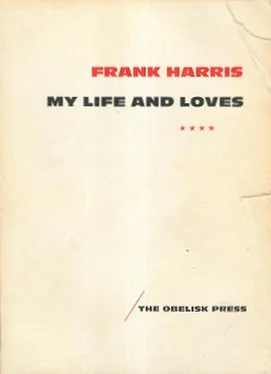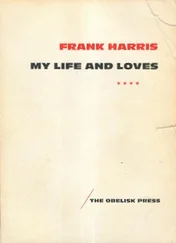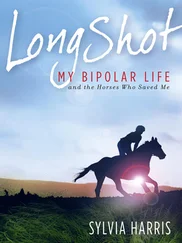Frank Harris - My Life and Loves, Book 1
Здесь есть возможность читать онлайн «Frank Harris - My Life and Loves, Book 1» весь текст электронной книги совершенно бесплатно (целиком полную версию без сокращений). В некоторых случаях можно слушать аудио, скачать через торрент в формате fb2 и присутствует краткое содержание. Жанр: Эротика, Секс, на английском языке. Описание произведения, (предисловие) а так же отзывы посетителей доступны на портале библиотеки ЛибКат.
- Название:My Life and Loves, Book 1
- Автор:
- Жанр:
- Год:неизвестен
- ISBN:нет данных
- Рейтинг книги:4 / 5. Голосов: 1
-
Избранное:Добавить в избранное
- Отзывы:
-
Ваша оценка:
- 80
- 1
- 2
- 3
- 4
- 5
My Life and Loves, Book 1: краткое содержание, описание и аннотация
Предлагаем к чтению аннотацию, описание, краткое содержание или предисловие (зависит от того, что написал сам автор книги «My Life and Loves, Book 1»). Если вы не нашли необходимую информацию о книге — напишите в комментариях, мы постараемся отыскать её.
My Life and Loves, Book 1 — читать онлайн бесплатно полную книгу (весь текст) целиком
Ниже представлен текст книги, разбитый по страницам. Система сохранения места последней прочитанной страницы, позволяет с удобством читать онлайн бесплатно книгу «My Life and Loves, Book 1», без необходимости каждый раз заново искать на чём Вы остановились. Поставьте закладку, и сможете в любой момент перейти на страницу, на которой закончили чтение.
Интервал:
Закладка:
Dickens I never could stomach, either as a boy or in later life. His Tale of Two Cities and Nicholas Nickleby seemed to me then about the best, and I've never had any desire since to revise my judgment after reading David Copperfield in my student days and finding men painted by a name or phrase or gesture, women by their modesty, and souls by some silly catch-word; «the mere talent of the caricaturist,» I said to myself, «at his best another Hogarth.» Naturally, the romances and tales of adventure were all swallowed whole; but few affected me vitally: The Chase of the White Horse by Mayne Reid, lives with me still because of the love scenes with the Spanish heroine, and Marryat's Peter Simple, which I read a hundred times and could read again tomorrow; for there is better character painting in Chucks, the boatswain, than in all Dickens, in my poor opinion. I remember being astounded ten years later when Carlyle spoke of Marryat with contempt.
I knew he was unfair, just as I am probably unfair to Dickens: after all, even Hogarth has one or two good pictures to his credit, and no one survives even three generations without some merit. In my two years I read every book in the library, and half a dozen are still beloved by me. I profited, too, from all games and exercises. I was no good at cricket; I was short-sighted and caught some nasty knocks through an unsuspected astigmatism; but I had an extraordinary knack of bowling, which, as I have stated, put me in the first eleven.
I liked football and was good at it. I took the keenest delight in every form of exercise: I could jump and run better than almost any boy of my age, and in wrestling and a little later in boxing, was among the best in the school. In the gymnasium, too, I practiced assiduously; I was so eager to excel that the teacher was continually advising me to go slow. At fourteen I could pull myself up with my right hand till my chin was above the bar. In all games the English have a high ideal of fairness and courtesy. No one ever took an unfair advantage of another and courtesy was a law. If another school sent a team to play us at cricket or football, the victors always cheered the vanquished when the game was over, and it was a rule for the captain to thank the captain of the visitors for his kindness in coming and for the good game he had given us. This custom obtained, too, in the Royal Schools in Ireland that were founded for the English garrison, but I couldn't help noting that these courtesies were not practiced in ordinary Irish schools. It was for years the only thing in which I had to admit the superiority of John Bull.
The ideal of a gentleman is not a very high one. Emerson says somewhere that the evolution of the gentleman is the chief spiritual product of the last two or three centuries; but the concept, it seems to me, dwarfs the ideal. A «gentleman» to me is a thing of some parts but no magnitude: one should be a gentleman and much more: a thinker, guide or artist. English custom in the games taught me the value and need of courtesy, and athletics practiced assiduously did much to steel and strengthen my control of all my bodily desires: they gave my mind and reason the mastery of me. At the same time they taught me the laws of health and the necessity of obeying them. I found out that by drinking little at meals I could reduce my weight very quickly and was thereby enabled to jump higher than ever; but when I went on reducing I learned that there was a limit beyond which, if I persisted, I began to lose strength: athletics taught me what the French call the juste milieu, the middle path of moderation. When I was about fourteen I discovered that to think of love before going to sleep was to dream of it during the night. And this experience taught me something else; if I repeated any lesson just before going to sleep, I knew it perfectly next morning; the mind, it seems, works even during unconsciousness. Often since, I have solved problems during sleep in mathematics and in chess that have puzzled me during the day.
Chapter III. School Days in England
In my thirteenth year the most important experience took place of my schoolboy life. Walking out one day with a West Indian boy of sixteen or so, I admitted that I was going to be «confirmed» in the Church of England. I was intensely religious at this time and took the whole rite with appalling seriousness. «Believe and thou shalt be saved» rang in my ears day and night, but I had no happy conviction. Believe what? «Believe in Me, Jesus.» Of course I believe; then I should be happy, and I was not happy. «Believe not» and eternal damnation and eternal torture follow. My soul revolted at the iniquity of the awful condemnation. What became of the myriads who had not heard of Jesus? It was all a horrible puzzle to me; but the radiant figure and sweet teaching of Jesus just enabled me to believe and resolve to live as he had lived, unselfishly-purely. I never liked that word «purely» and used to relegate it to the darkest background of my thought. But I would try to be good-I'd try at least!
«Do you believe all the fairy stories in the Bible?» my companion asked. «Of course I do,» I replied. «It's the Word of God, isn't it?» «Who is God?» asked the West Indian. «He made the world,» I added, «all this wonder,» and with a gesture I included earth and sky. «Who made God?» asked my companion. I turned away stricken: in a flash I saw I had been building on a word taught me: «who made God?» I walked away alone, up the long meadow by the little brook, my thoughts in a whirl: story after story that I had accepted were now to me «fairy stories.» Jonah hadn't lived three days in a whale's belly. A man couldn't get down a whale's throat. The Gospel of Matthew began with Jesus' pedigree, showing that he had been born of the seed of David through Joseph, his father, and in the very next chapter you are told that Joseph wasn't his father; but the Holy Ghost. In an hour the whole fabric of my spiritual beliefs lay in ruins about me: I believed none of it, not a jot, nor a tittle: I felt as though I had been stripped naked to the cold. Suddenly a joy came to me: if Christianity was all lies and fairy tales like Mohammedanism, then the prohibitions of it were ridiculous and I could kiss and have any girl who would yield to me. At once I was partially reconciled to my spiritual nakedness: there was compensation. The loss of my belief was for a long time very painful to me. One day I told Stackpole of my infidelity, and he recommended me to read Butler's Analogy and keep an open mind. Butler finished what the West Indian had begun and in my thirst for some certainty I took up a course of deeper reading. In Stackpole's rooms one day I came across a book of Huxley's Essays; in an hour I had swallowed them and proclaimed myself an «agnostic»; that's what I was; I knew nothing surely, but was willing to learn. I aged ten years mentally in the next six months: I was always foraging for books to convince me and at length got hold of Hume's argument against miracles. That put an end to all my doubts, satisfied me finally. Twelve years later, when studying philosophy in Goettingen, I saw that Hume's reasoning was not conclusive, but for the time I was cured. At midsummer I refused to be confirmed. For weeks before, I had been reading the Bible for the most incredible stories in it and the smut, which I retailed at night to the delight of the boys in the big bedroom.
This year as usual I spent the midsummer holidays in Ireland. My father had made his house with my sister Nita where Vernon happened to be sent by his bank. This summer was passed in Ballybay, in County Monaghan, I think. I remember little or nothing about the village save that there was a noble series of reed-fringed lakes near the place which gave good duck and snipe shooting to Vernon in the autumn.
Читать дальшеИнтервал:
Закладка:
Похожие книги на «My Life and Loves, Book 1»
Представляем Вашему вниманию похожие книги на «My Life and Loves, Book 1» списком для выбора. Мы отобрали схожую по названию и смыслу литературу в надежде предоставить читателям больше вариантов отыскать новые, интересные, ещё непрочитанные произведения.
Обсуждение, отзывы о книге «My Life and Loves, Book 1» и просто собственные мнения читателей. Оставьте ваши комментарии, напишите, что Вы думаете о произведении, его смысле или главных героях. Укажите что конкретно понравилось, а что нет, и почему Вы так считаете.










